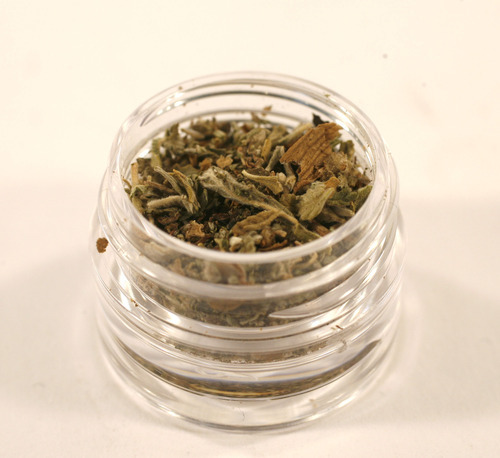This is an archived article that was published on sltrib.com in 2011, and information in the article may be outdated. It is provided only for personal research purposes and may not be reprinted.
Buyer beware: That incense and those bath salts could be illegal.
Gov. Gary Herbert signed HB23 on Friday morning, effectively banning the sale, possession and manufacture of several recreational drugs, most commonly known as "spice" and "Ivory Wave," in Utah. The bill features no time element and takes effect immediately.
The bill bans 17 synthetic cannabinoids, the active ingredients in the drugs. Spice and Ivory Wave are both marketed as relaxation products — incense and bath salts, respectively — but are often smoked or inhaled to produce a marijuana-like high.
The list of banned substances is by no means complete, with chemists constantly discovering new synthetic compounds that can be substituted into the drugs, said sponsor Rep. Gage Froerer, R-Huntsville. Banning new chemicals could become an annual legislative exercise, he said, but the current incarnation gives law enforcement officials a healthy start.
To keep up with demand, the Legislature may allow the Substance Abuse Advisory Committee to begin adding compounds to the list, Froerer said.
"The reason these drugs are out there is there are high profit motives," Froerer said.
Now that the ban is in effect, individual agencies will determine how they enforce the bill, said Paul Boyden of the Statewide Association of Prosecutors. Sellers are encouraged to contact local law enforcement, which can pick up illegal products and destroy them properly.
Some agencies plan to take an educational approach to the issue, said Sgt. Scott VanWagoner with the Unified Police Department. Officers will contact smoke shops and other sellers to inform them of the ban. Sellers will not be prosecuted for voluntarily turning over products.
Utah health officials are asking for new equipment that would allow them to test for synthetic cannabinoids in blood and urine that would be covered by a $350,000 appropriation for the Utah Public Health Laboratories. Labs in Utah can currently test spice itself, Boyden explained, but have no way to test individuals for intoxication. With the announcement that the state expects an additional $47 million in revenue, Boyden and Froerer are hopeful the appropriation will be approved.
Several cities and counties have already banned the substances, but the statewide law will supersede those ordinances. Ogden resident Dan Deuel said Friday that he noticed a dramatic drop in traffic at the smoke shop near his children's elementary school soon after the city banned spice. But traffic picked up again as Ivory Wave became more popular. He hopes the new law will prevent sellers from moving to neighboring communities to stay ahead of local ordinances.



